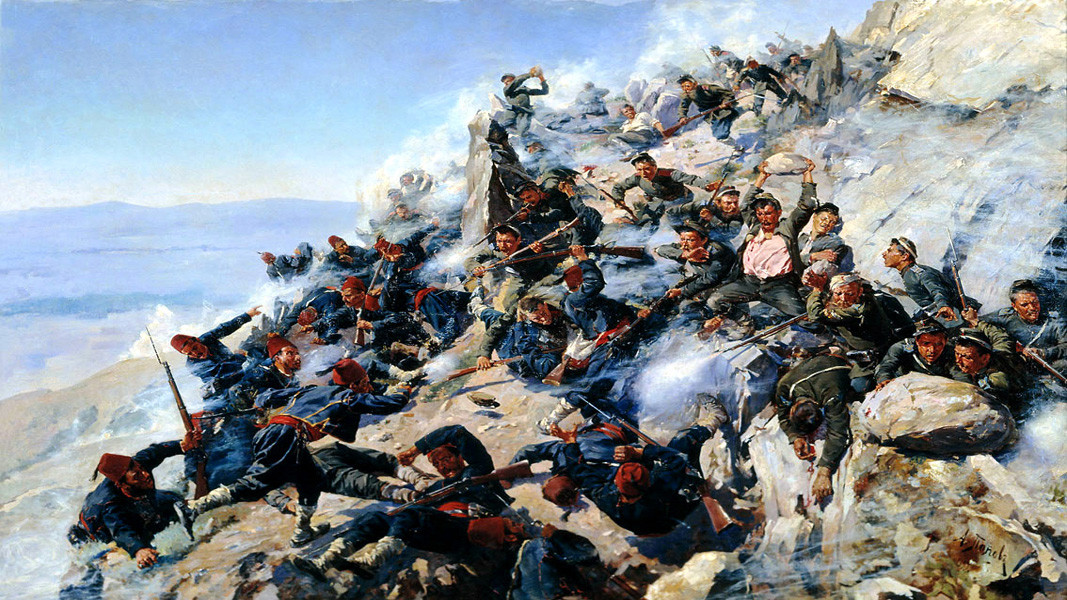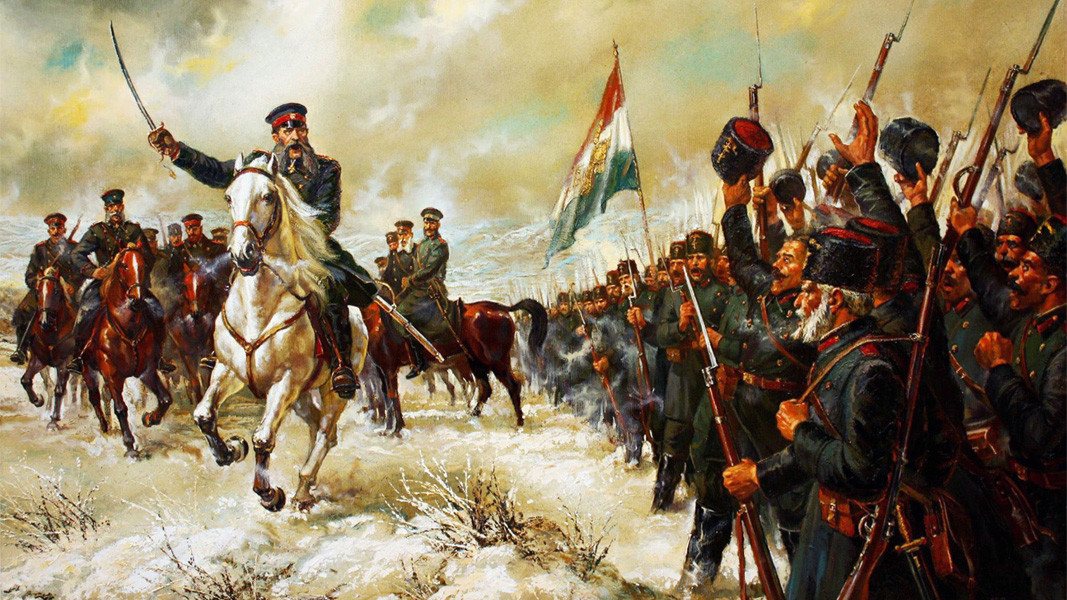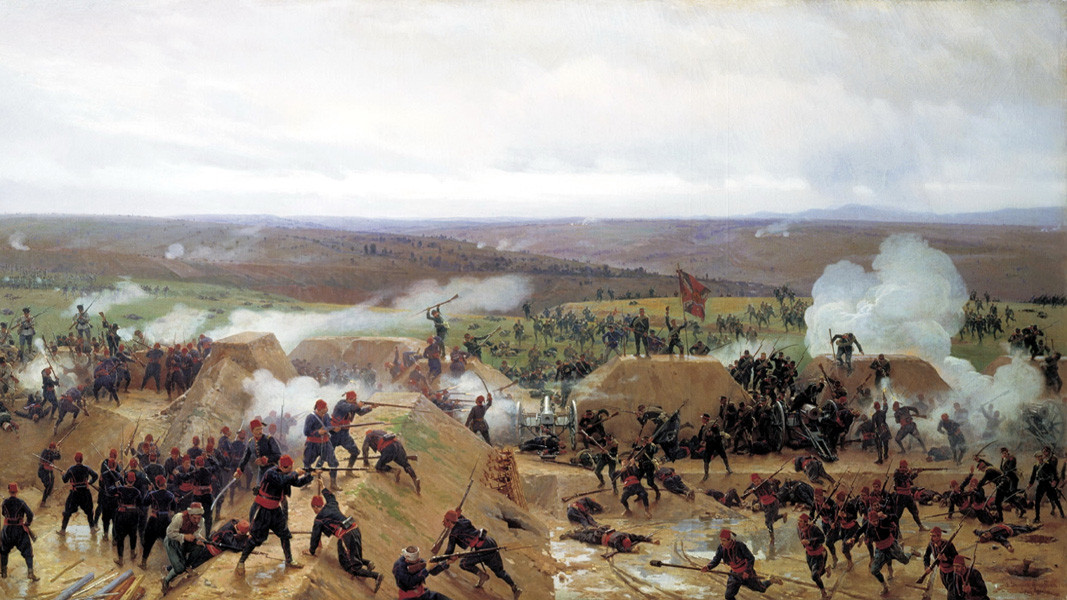International solidarity and secret diplomacy

The Bulgarian liberation movement culminated in the April Uprising of 1876. It was brutally suppressed by the regular Ottoman army and irregular bashi-bazouk units, resulting in a public outcry in Europe with many famous intellectuals condemning the atrocities of the Ottomans and supporting the oppressed Bulgarian population. A foreign group of intellectuals including American war correspondent Januarius MacGahan visited the massacre sites. MacGahan wrote vivid articles from Bulgaria which moved British public opinion against the Ottomans.
In Russia the movement for solidarity was strong and synchronized with the age-old aspirations of the Russian monarchy for domination over the straits (Bosporus and Dardanelles). In order to prevent new isolation Russia began intensive diplomatic preparations for the war against the Ottoman Empire. The talks between the Great Powers perhaps shaped the map of the Balkans after the war with Russia agreeing on a series of compromises. Thus, on April 24, 1877, Russia’s Emperor Alexander II was free to declare the Russo-Turkish War of Liberation.
Unexpectedly severe war and compromise peace agreement

The Ottoman army proved a strong opponent. The war was much longer, difficult and fierce than the authorities in Sankt Petersburg had expected. It was won with plenty of heroism and huge support by the Bulgarians. Bulgarian rebel groups and volunteer corps fought side by side with the Russian army. The Bulgarian volunteers participated in a series of key battles, including the most-important battle- the heroic defense of the Shipka Pass between August 21 and 26, 1877. Russian and Bulgarian troops pushed back the troops of Süleyman Pasha who made a counter-offensive towards North Bulgaria. After the victory near Pleven in December 1877 and the capitulation of the Ottoman army of Field Marshal Osman Pasha the Russian commanders planed a winter march through the Balkan Mountain Range. All military experts thought the operation would fail. However, it proved successful due to the large support provided by the Bulgarian volunteers. The Russian army advanced southwards and won glorious victories near Sofia, Shipka-Sheynovo and Plovdiv. On March 3, 1878, the Peace Treaty of San Stefano was signed. However, the destiny of the Bulgarian lands was decided during the Berlin Congress, where the backstage negotiations and compromises between the Great Powers materialized. The Principality of Bulgaria (now north Bulgaria and Sofia district) was a de facto independent and de jure vassal state of the High Porte. Part of South Bulgaria became an autonomous province within the Ottoman Empire and one-third of the territory of the Bulgarian Exarchate was unconditionally returned to the Sultan. The fight of the Bulgarians for unification lasted for four more decades.
Liberation and world policy

The role of the Tsardom of Russia and its policy on the Balkans became contestable right after the liberation from the Ottoman Rule when the Bulgarian elite were divided into Russophiles and Russophobes. Russia was at that time an authoritarian state and the Bulgarian national revolution was based on western ideas. But even in times of fierce confrontation between Russophiles and Russophobes, nobody questioned the act of Bulgaria’s Liberation. In 1888 March 3 was declared a National Liberation Day. On this date the name Bulgaria appeared again on the European map after five centuries of Ottoman Rule. The holiday was not cancelled even between 1915 and 1918 and between 1941 and 1944 when this country was an ally of Germany during the two world wars and in 1916 was in a heavy battle against Russia in Dobrudzha. In 1991 March 3 was declared a national holiday in Bulgaria. The Bulgarians are still debating when this country should celebrate its national holiday. However, the memory of our forefathers who fell for Bulgaria’s liberation should be honored on this date, because even Russia would not have been able to liberate us from the Ottoman Rule without the Bulgarian national revival and the struggle for independence.
There are no ifs in history. Even from today’s perspective we cannot see much different opportunities for the liberation of Bulgaria in the 19th century. Our ancestors liberated our country with the help of Russia. They took this opportunity, because geopolitics is not a love dance, but is rather a game of interest. We cannot argue with history. We can only take the good parts achieved with peoples’ dreams, efforts and sacrifice and sift the diamonds from the ashes.
English version: Kostadin Atanasov
The newest exhibition at the National Museum of Military History in Sofia, 'War and the Creatives: A Journey Through Darkness' opens today, offering free entry as a gesture to those who were unable to visit during the recent renovations. Rather than..
A 5,000-year-long history lies hidden in the ruins of the medieval fortress “Ryahovets” near the town of Gorna Oryahovitsa where active excavations began ten years ago. On this occasion, on November 17, the Historical Museum in Gorna Oryahovitsa..
Just days ago, archaeologists uncovered part of the complex underground infrastructure that once served the Roman baths of Ratiaria - one of the most important ancient cities in Bulgaria’s northwest. Founded in the 1st century in the area of..

+359 2 9336 661
